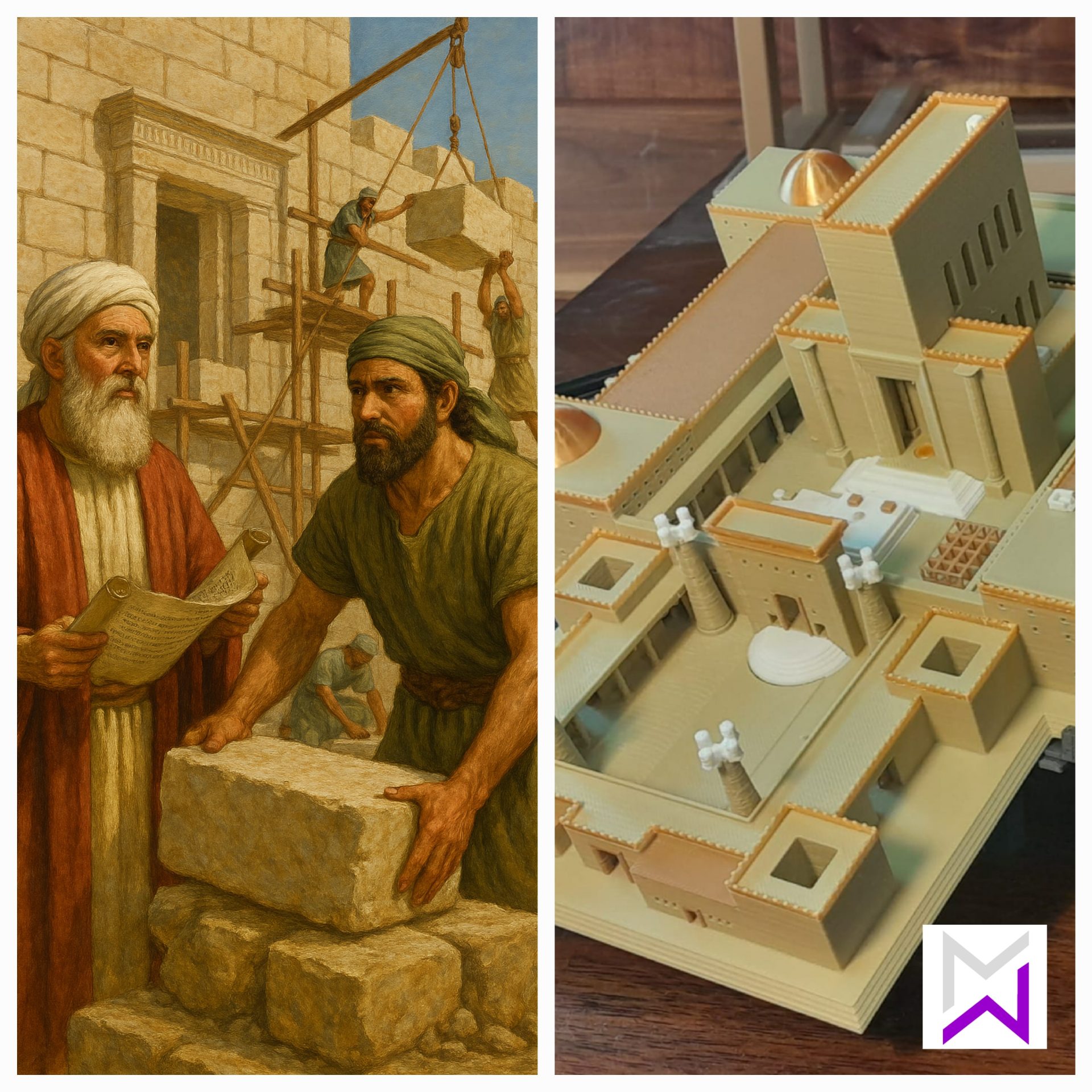In the dusty streets of Jerusalem, beneath a sky streaked with the golden hues of dawn, a small crowd gathered near the ruins of the once-glorious Temple. The year was in the time of the Persian king Artaxerxes, and the returned exiles, led by Ezra the scribe and Nehemiah the governor, stood at a crossroads. The people had come back from Babylon with a flicker of hope, yet the city lay in shambles, its walls broken, and the Temple a heap of stones. Among them stood two men of influence: Zerubbabel, the leader appointed by God to oversee the rebuilding, and Shemaiah, a cautious priest known for his deep reverence for Hashem.
Zerubbabel, his hands calloused from labor and his eyes alight with determination, addressed the assembly. “The king has given us his blessing—timber from his forests, gold from his treasury, and peace to work. The words of the prophet Haggai still ring true: ‘Go up to the hills, bring wood, and build the House, that I may take pleasure in it and be glorified,’ says Hashem. We must act now, for this is our calling.”
Shemaiah stepped forward, his robes swaying gently in the breeze, his voice steady but firm. “Zerubbabel, I honor your zeal, but consider this: the Temple is Hashem’s dwelling place, a holy sanctuary. Should we, mere men, presume to rebuild it with our own hands? The prophet Isaiah spoke of a day when Hashem Himself would restore Zion, when the nations would marvel at His work alone. Should we not wait for Him to act, to send His anointed one to raise these stones? To move without His clear hand is to risk defiling His sanctity.”
A murmur rippled through the crowd. Some nodded at Shemaiah’s words, their hearts heavy with the memory of exile and their fear of overstepping. Others looked to Zerubbabel, whose face tightened with resolve.
Ezra, the scribe, his scroll of the Torah tucked under his arm, joined the debate. “Shemaiah, your reverence is not misplaced, but hear what Hashem has already spoken through His prophets. In the days of Haggai, when our fathers hesitated, He said, ‘Is it a time for you to dwell in your paneled houses while this House lies in ruins?’
Hashem stirred the spirit of Zerubbabel and the people—not to sit idly, but to work. And through Jeremiah, He promised restoration, yet it came when we returned, when we acted. The king’s decree is no accident; it is Hashem’s provision through our steps of faith.”
Nehemiah, leaning on his staff, added his voice, practical and unwavering. “When I came to Jerusalem, the walls were rubble, a reproach to our God. I did not wait for the stones to rise on their own. I prayed, yes, but then I took up the sword and the trowel. Hashem blessed our labor, and the walls stand because we honored Him by acting. The Temple is no different. We rebuild not to usurp His glory, but to give Him a place to dwell among us again.”
Fast forward to Israel Today…
In the modern land of Israel, the echoes of Zerubbabel, Ezra, and Nehemiah resonate still. The nation itself, reborn from the ashes of exile in 1948, stands as a testament to a people who did not wait for the world to hand them their destiny. Pioneers drained swamps, planted forests, and built cities—not because the skies opened to do it for them, but because they saw in the Torah and the prophets a call to act, to partner with Hashem in redeeming the land. Today, from the bustling streets of Tel Aviv to the quiet hills of Samaria, Jews continue to build—schools, synagogues, families—each brick laid an offering of faithfulness. The challenges are new, the tools modern, but the principle remains: Hashem blesses the hands that move, the hearts that dare to honor Him through action.
Faithfulness Over Faith
So let this be our encouragement: do not merely hold faith as a quiet hope, a passive waiting for Hashem to sweep in. Embrace faithfulness—the active, living obedience that takes up the hammer, the plow, the pen, and builds. The Torah commands us to love, to teach, to do justice—not to sit and wish for them. Zerubbabel did not wait for the Temple to rise; he lifted the stones. Nehemiah did not wait for the walls to stand; he rallied the people. You, too, are called to step out—to repair what is broken, to plant where there is barrenness, to honor Hashem with the work of your hands. Faithfulness is faith in motion, and it is through this that His glory shines. Go, build, and trust that He walks with you on the path you tread.


Leave a Reply